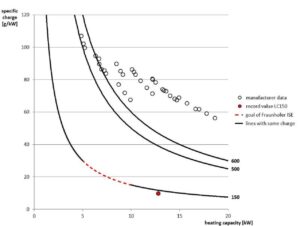
Propane Refrigeration Circuit Sets New Efficiency Record

In the search for the best heat pump, dozens of combinations of components are tested in the LC150 project.
Credit: Fraunhofer ISE
… Achieves New Efficiency Record.
Currently heat pump manufacturers are mainly focusing on cost reductions and sustainable refrigerants. In the project “LC150” (Low Charge 150 g), the Fraun-hofer Institute for Solar Energy Systems ISE and a consortium of heat pump manufacturers are developing a standardized and refrigerant-reduced propane refrigeration circuit. The team has now succeeded in setting a new efficiency record: A heating capacity of 12.8 kilowatts was achieved with only 124 grams of propane, which results in a specific refrigerant charge of approximately 10 g/kW.
Fraunhofer ISE will be showing a refrigeration circuit prototype from the project at the upcoming Chillventa Trade Fair (Oct. 11-13, 2022, Messe Nuremberg).
Since October 2021, the Fraunhofer ISE project team has been building prototypes for brine heat pumps, assembling the individual components (evaporator, compressor, con-denser, heat exchanger and expansion valve) in a variety of different constellations. These modules are measured on test stands 24 hours a day for two weeks at a time. Each prototype is run at between 30 and 150 operating points, and the measured values are recorded by 26 sensors. In the search for the ideal heat pump, 26 prototypes have been built so far, 14 of which have already passed through the complete measurement matrix.
Five Cigarette Lighters Needed for One Kilowatt Heating Power
The device with the best constellation of components achieved a maximum heating capacity of 12.8 kilowatts and an efficiency of 4.7 (ratio of heat generated to electricity used) with only 124 grams of propane. That means the amount of refrigerant required per kilowatt of heating capacity was only 9.7 grams of propane. “This is roughly equiva-lent to the amount of propane in five cigarette lighters,” compares project manager Clemens Dankwerth of Fraunhofer ISE. The project’s goal of reducing the specific amount of refrigerant to between 15 – 30 grams/kilowatt has thus been clearly exceed-ed. Commercially available heat pumps use about 60 grams of propane per kilowatt. Propane is characterized by very good thermodynamic properties and low global warm-ing potential. However, since it is flammable, the aim is to use as little propane as pos-sible.

Credit: Fraunhofer ISE
The record-breaking refrigeration circuit is not yet ready for market launch in this form, because a semi-hermetic automotive compressor was used. This requires less refrigerant at a higher capacity thanks to its high rotational speed and low oil volume. So far, au-tomotive compressors have not been designed for the high operating hours of a heat pump that is meant to last 20 years. “However, the manufacturer is already working on fully hermetic compressors with a longer service life,” says Clemens Dankwerth, looking ahead.
The final version of the record refrigeration circuit would be implemented with slightly more refrigerant and a slightly larger heat exchanger to achieve a more bal-anced system. The research team is confident that the goals of the LC 150 project – a refrigeration circuit with an output of 8 to 10 kilowatts and a maximum charge of 150 grams of refrigerant – can thus be achieved even under real operating conditions.
The second-best refrigeration circuit in the test program so far also met the project’s targets, with a charge of 164 grams of propane at an efficiency of 4.8 percent and a heating capacity of 8.1 kilowatts. A conventional fully hermetic compressor was used here.
Optimization of Other Heat Pump Components
In addition to the compressor, the research team also adjusted other factors in order to reduce the amount of refrigerant. For example, the internal volume of the heat ex-changers and the amount of oil required have been reduced. Additional components such as sensors have also been kept to a minimum. In addition, the piping was kept as short as possible to reduce the internal volumes.
The LC150 project (FKZ 03EN4001A), which is funded by the German Federal Ministry of Economics and Climate Protection (BMWK), runs until March 2023. The researchers aim to derive methodological correlations based on the database obtained in the cross tests so that refrigerant-reduced heat pumps can be designed with less effort in the fu-ture. To this end, the Technical University of Valencia is developing a tool for simulative predictions with its IMST-Art software. During the measurement campaign, the simula-tion results are compared with the actual measured values and the software is thus con-tinuously improved. The industrial partners of the LC150 project consortium can also access the results of the measurement campaign in order to evaluate them according to their own specifications.
At the Chillventa 2022, the world’s leading trade fair for refrigeration technology, Fraunhofer ISE will show a refrigeration circuit from the LC150 project at its booth (Hall 4A/Stand 306). Further topics being shown are the current monitoring project on heat pumps in existing buildings and efficient large-scale heat pumps for industry.
Wissenschaftliche Ansprechpartner:
Clemens Dankwerth: clemens.dankwerth@ise.fraunhofer.de
Weitere Informationen:
https://www.ise.fraunhofer.de/en/research-projects/lc-150.html More Information on the Project














